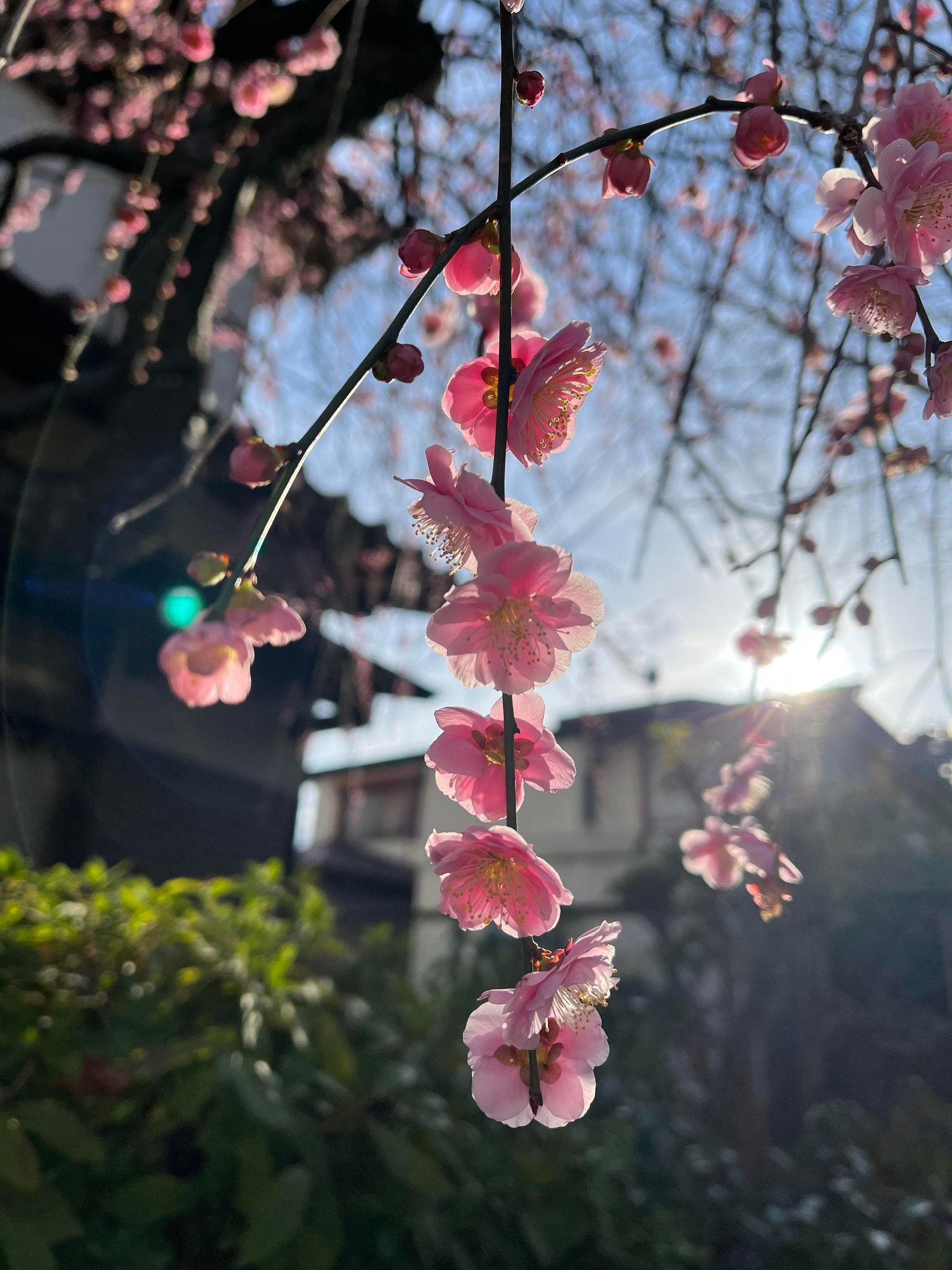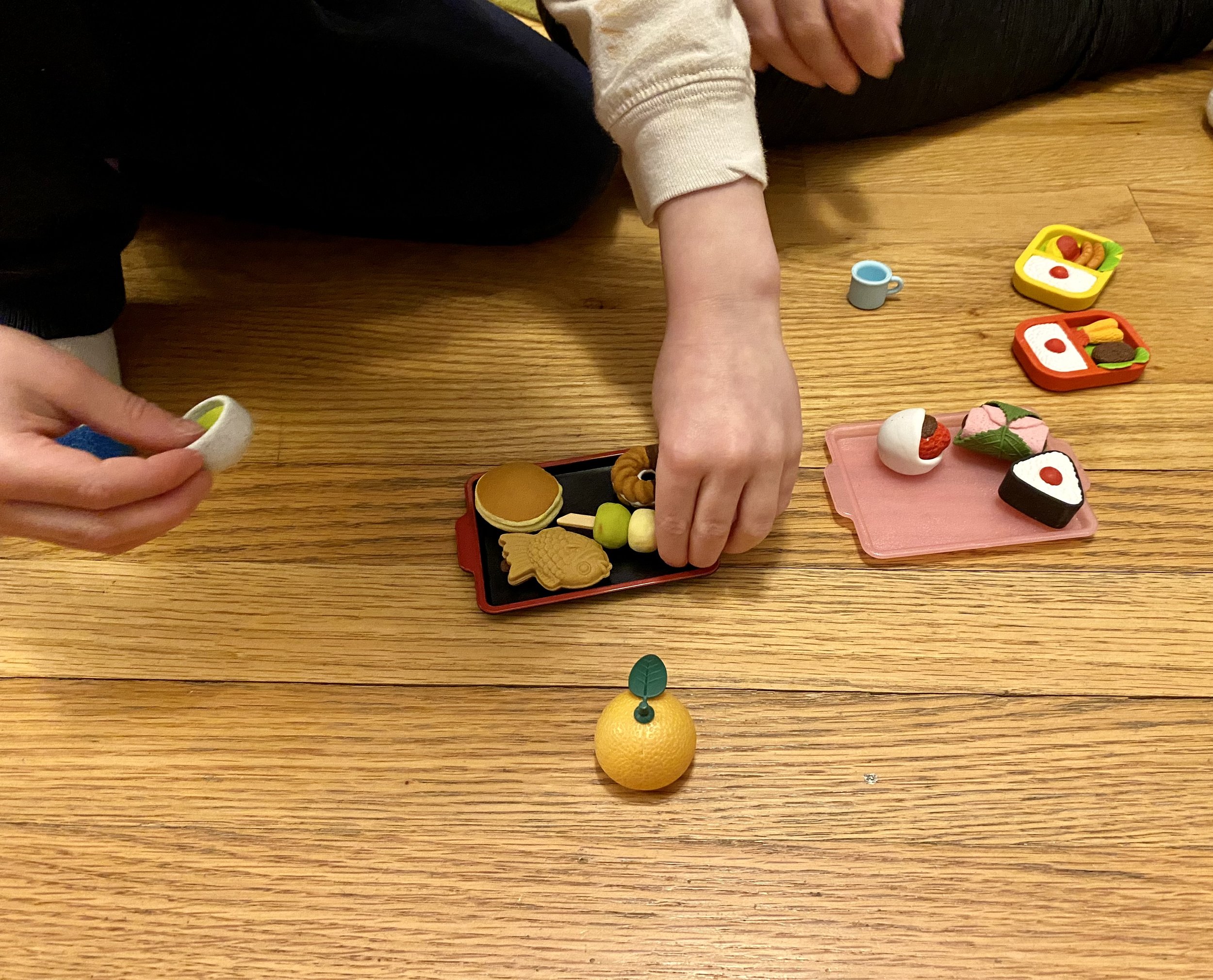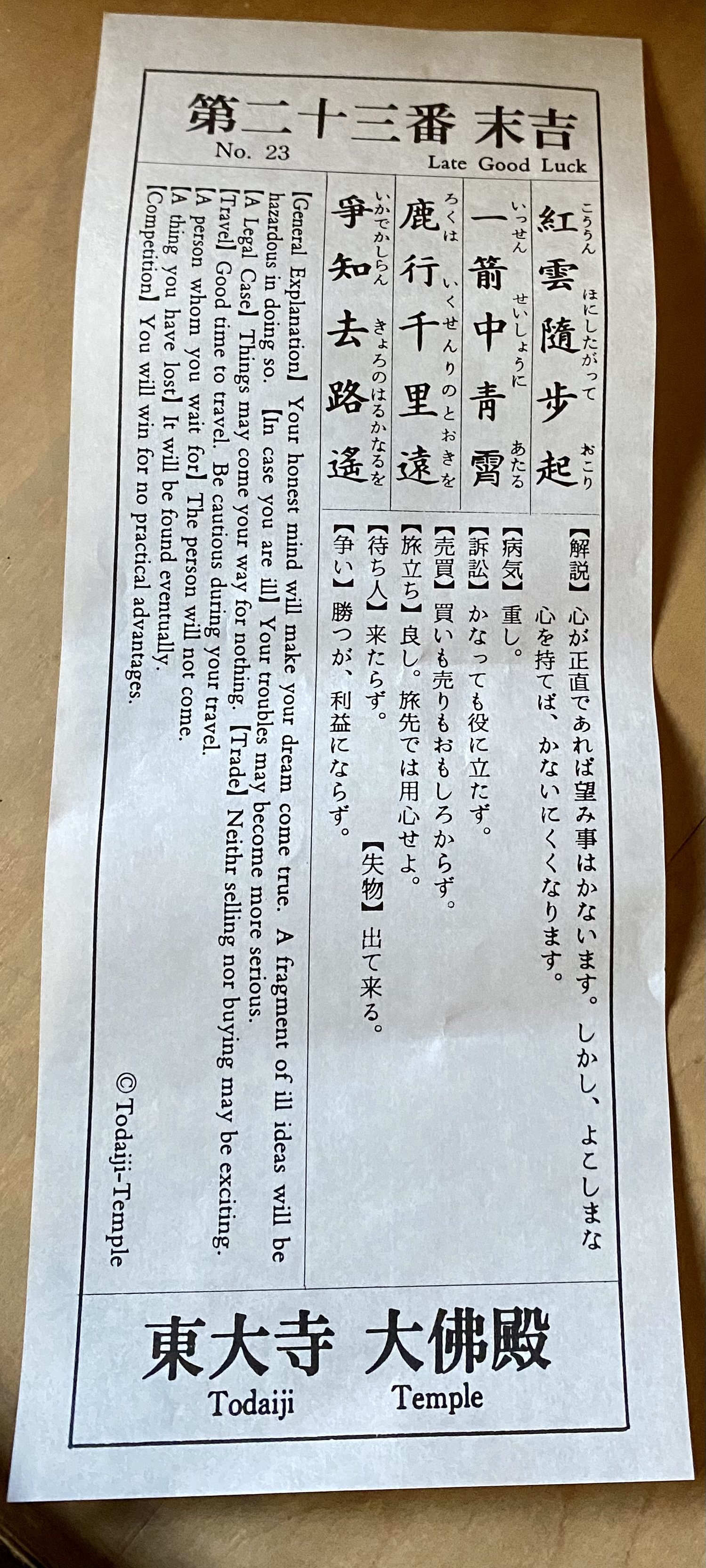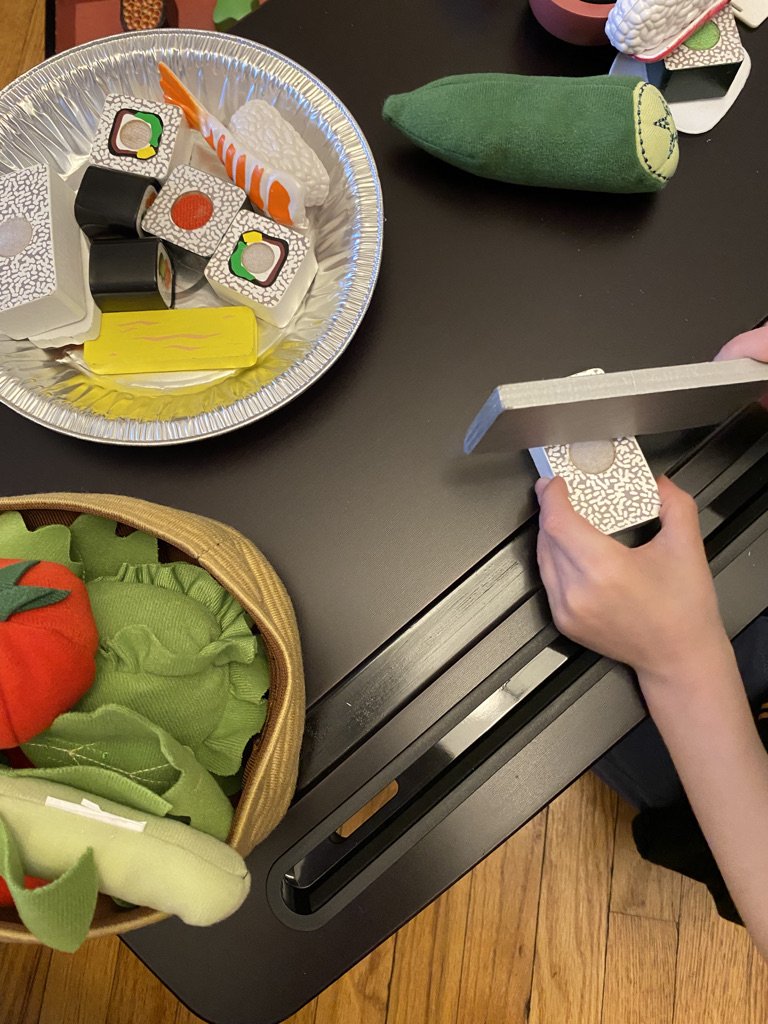夢を叶える-Shikou 88 temples pilgrimage
Today, I received a beautiful picture postcard from Robert-san who is currently traveling in Japan for the first time. The picture in the postcard is Matsuyama castle in Ehime-ken. Robert-san was travelling with his cousin in July mainly in Shikoku region. O-henro is an ancient Buddhist pilgrimage route in the Shikoku region and they have visited many temples.
Robert-san said that he had written this postcard in Shodo-shima Island. He also mentioned that he had to give up on his bicycle trip due to the extreme heat , but he enjoyed watching a baseball game. He wrote the card very carefully in beautiful handwriting using many Chinese characters. He also wrote a special message for me at the end; thank you very much for teaching me the Japanese language.
He is leaving Osaka tomorrow in Japan time and will come back to Canada. Thanks to Robert-san, I had a wonderful day, thank you very much, Robert-san. I look forward to hearing your travel stories.
今日(きょう)、初(はじ)めて日本(にほん)を旅行(りょこう)しているロバートさんからきれいな絵葉書(えはがき)が届(とど)きました。絵葉書の絵(え)は愛媛県(えひめけん)にある松山城(まつやまじょう)です。ロバートさんは従姉妹(いとこ)さんと一緒(いっしょ)に7月(しちがつ)中旬(ちゅうじゅん)から四国(しこく)を中心(ちゅうしん)に日本(にほん/にっぽん)を旅行(りょこう)していました。お遍路(へんろ)は日本の四国地方(しこくちほう)の古代(こだい)の巡礼路(じゅんれいろ)で、ロバートさんたちも四国で沢山(たくさん)のお寺(てら)のお参(まい)りをしたそうです。
この葉書を小豆島(しょうどしま)で書(か)いてくれたそうです。とても暑(あつ)いので自転車(じてんしゃ)の移動(いどう)ができなくなったことや、野球(やきゅう)の試合(しあい)も観(み)に行(い)ったことも書いてくれていました。たくさん漢字(かんじ)も使(つか)って、とてもきれいな字(じ)で、最後(さいご)に「日本語(にほんご)を教(おし)えてくれてありがとうございました。」と書いてくれていました。
日本時間(にほんじかん)で明日(あした)の夜(よる)、大阪(おおさか)を発(た)ってカナダへ帰(かえ)って来(く)るそうです。今日も、ロバートさんのお陰(かげ)でいい1日(いちにち)が過(す)ごせました。ロバートさん、ありがとうございます。ロバートさんの土産話(みやげばなし)を楽(たの)しみにしています。
仲良しチームNakayoshi Team
They are holding 3 Taiyaki; 27 +3 = 30
On Thursday, July 13th, the Nakayoshi Team (Best friends team) and I gathered to celebrate their birthdays at Café Taiyaki 52 on Brunswick Street. All the students in the Nakayoshi-team have their birthdays in either June or July so we celebrated their birthday together. They have been good friends since they were university students and have been studying Japanese together when they have the time. I wish them the best year ahead as they turn 30 together.
7月13日(しちがつさんじゅうにち)の木曜日(もくようび)に仲良(なかよ)しチームの皆(みな)さんとカフェたい焼(や)き52で誕生日会(たんじょうびかい)をしました。この3人(さんにん)の仲良しチームの生徒(せいと)の皆さんは誕生日が6月か7月なので、一緒(いっしょ)にお祝(いわ)いしました。この3人は大学(だいがく)の頃(ころ)からずっととても仲(なか)が良(い)い友達で、時間(じかん)がある時(とき)に(あつ)まって一緒に日本語(にほんご)を勉強(べんきょう)しているそうです。30歳(さんじゅっさい)のお誕生日を迎(むか)えられた皆さんに、たくさんいいことがあることをお祈(いの)りしています。
I am holding Spinach Feta Taiyaki and we had many Vegan Mini Gangs.
夢を叶える-Make your dreams come true
This is a Japanese magazine that Japanese teenage girls read. Hannah-san used to read this magazine when she was a high school student. Several weeks ago, kind Hannah-san’s mother brought it to my house so that I can use it for my lessons.
On the cover page of the 13-yer old magazine, it says, “Special makeup to make your dreams come true!”. I don’t think make-up will make your dreams come true, but it might give people a good impression.
Hannah-san, who was a high school student, has grown into a sophisticated and intelligent lady. She told me that she has been studying Japanese even after graduating from high school. Hannah-san came back to my Japanese class before the trip, but because she has been studying Japanese for a long time, she was able to speak to me in Japanese fluently with very beautiful pronunciation. Hannah told me that she was able to speak with immigration officers at the airport or at the hotel reception, and even sent a suitcase by courier!
Hannah-san has finally fulfilled her dream, and her journey has just begun to fully enjoy Japan. What dreams would you like to make come true?
これは、10代(だい)の日本人(日本人)の女(おんな)の子(こ)たちが読(よ)む雑誌(ざっし)です。ハナさんが高校生(こうこうせい)の時(とき)に読(よ)んでいた雑誌です。何週間(なんしゅうかん)か前(まえ)に、優(やさ)しいハナさんのお母(かあ)さま(さま)が、日本語教室(にほんごきょうしつ)で使(つか)ってくださいとメッセージを添(そ)えて、私(わたし)にこの雑誌(ざっし)を届(とど)けてくださいました。
13年前(ねんまえ)の雑誌(ざっし)の表紙(ひょうし)に「夢(ゆめ)をかなえる、メイクスペシャル」と書(か)いてあります。お化粧(けしょう)で夢(ゆめ)が叶(かな)えられるとは思(おも)いませんが、いい印象(印象)は与(あた)えられるかもしれませんね。
この高校生(こうこうせい)だったハナさんは、素敵(すてき)で知的(ちてき)な女性(女性)になられましたが、ずっと高校を卒業(そつぎょう)してからも日本語を勉強(べんきょう)されていたそうです。ハナさんは旅行(りょこう)の前(まえ)にまた私の日本語教室に戻(もど)ってきてくれましたが、自分(じぶん)でずっと日本語の勉強をされていただけあって、とてもきれいな発音(はつおん)で流暢(りゅうちょう)に私と日本語で話(はなし)ができるようになっていました。飛行場(ひこうじょう)やホテルの受付(うけつけ)での会話(かいわ)、宅配便(たくはいびん)でスーツケースを送(おく)ることもできたそうです。
ハナさんは夢を叶えて、日本を満喫(まんきつ)する旅(た日)が始(はじ)まりました。皆(みな)さんはどんな夢を叶えたいですか?
O-hanami/お花見
Hello everyone!
I am going to hold our o-hanami event on Saturday, May 27, this year again! Let’s gather and view beautiful Cherry Blossoms and meet people who love Japanese culture!
Please let me know that you are joining us by emailing me or texting me.
I will prepare inari-zushi and some snacks, so please let me know how many people are in your group.
The date and time: Saturday, May 27 at 1:00 PM- around 2:30 PM
The meeting location: The parking lot of the Dartmouth Commons
Fee: No fee!
Note: Please wear a long sleeve-shirt or jacket to protect yourself from ticks.
I will be holding an imitation Cherry Blossom branch, so you can find me.
今年(ことし)も、私(わたし)と一緒(いっしょ)にお花見(はなみ)をしませんか?みんなできれいな桜(さくら)を鑑賞(かんしょう)して、日本(にほん)の文化(ぶんか)に興味(きょうみ)がある人達(ひとたち)に会(あ)いませんか?
参加希望者(さんかきぼうしゃ)は、ここをクリックしてメールで、または携帯(けいたい)メールでお知(し)らせください。いなりずしやスナックを用意(ようい)しますから、何名(なんめい)来(こ)られるかも書(か)いてください。
日時(にちじ):5月27日(土曜日)午後1時から午後2時半ごろまで
ごがつ にじゅうしちにち どようび ごごいちじ から ごごにじはん ごろ まで
集合場所(しゅうごうばしょ):ダートマス・コモンズの駐車場(ちゅうしゃじょう)
費用(ひよう): 無料(むりょう)です。
追記(ついき): 私(わたし)はイミテーションの桜(さくら)の花(はな)の枝(えだ)を持(も)っていますから、私(わたし)を見(み)つけてくださいね。ダニ予防(よぼう)のため、長袖(ながそで)のシャツやジャケットを着(き)て来(き)てください。
Yaezakura
One of my Japanese friends sent me many photos of cherry blossoms. Cherry blossoms bloom all over Japan from the end of March through April. The most famous is the Somei-Yoshino cherry tree, which has a whitish-pink, single flower with five petals. When the Somei-Yoshino cherries fall, the next blooms are double cherry blossoms, Yaezakura, that come in various kinds, including dark pink, pale pink, and even whitish. Double-flowered cherry blossoms have many petals overlapping each other; they look a lot like roses, don’t they?
日本人(にほんじん)の友達(ともだち)が私(わたし)にたくさん桜(さくら)の花(はな)の写真(しゃしん)を送(おく)ってくれました。3月(さんがつ)の終(お)わり頃(ごろ)から4月(しがつ)にかけて日本各地(にほんかくち)で桜(さくら)が咲(さ)きます。一番有名(いちばんゆうめい)なのは、ソメイヨシノと言(い)う桜(さくら)で、白(しろ)っぽいピンクで花(はな)びらが5枚(ごまい)の一重咲(ひとえざ)きです。ソメイヨシノが散(ち)ってしまうと、今度(こんど)は濃(こ)いピンクや淡(あわ)いピンクや白っぽいのもあるいろいろな品種(ひんしゅ)がある八重桜(やえざくら)が咲(さ)きます。八重桜は何枚(なんまい)もの花びらが重(かさ)なって咲きます。バラによく似ていますね。
Crocus flowers
This week, finally my Crocus flowers have bloomed!
Crocus flowers herald the arrival of Spring in Halifax.
I look forward to seeing these flowers bloom every year.
Thank you, Crocus flowers! I hope to see cute flowers bloom next year, too…
今週、やっとクロッカスの花が咲きました。 クロッカスの花がハリファックスに春の訪れを告げてくれます。私は毎年クロッカスの花が咲くのを楽しみにしています。ありがとう、クロッカス!来年も可憐な花が見られますように…
Maccha-steamed bun
Today, I made maccha-steamed bun with sweet bean paste. It was my first time making this kind, but it was not bad. I also made raisin steamed bun, which I make once in a while, as well.
今日(きょう)、あずきの粒(つぶ)あんの抹茶蒸(まっちゃむ)しパンを作(つく)ってみました。こんなのは初(はじ)めてでしたが、わりとおいしかったです。たまに作る、レーズンの蒸しパンも作りました。
Plum Blossoms
I have heard that plum blossoms herald the coming of Spring in Japan! Today, my friend who lives in Japan sent me this picture. She said that she enjoys the sweet scent of plum blossoms. I can almost smell it from here…
梅(うめ)の花(はな)が日本(にほん)に春(はる)の到来(とうらい)を告(つ)げているそうです。今日(きょう)、日本に住(す)む私(わたし)の友人(ゆうじん)が私にこの写真(しゃしん)を送(おく)ってくれました。梅(うめ)の甘(あま)い香(かお)りがしているそうです。その花の香りがここまで漂(ただ)ってくるようです…
Naoki-kun’s Picnic
Last Monday, 4-year-old Naoki-kun and his mom played with miniature picnic sets.
He is gathering sweets and tea while his mom is making o-bentō ready.
先週(せんしゅう)の月曜日(げつようび)、4歳(よんさい)の直樹(なおき)くんは、お母(かあ)さんと一緒(いっしょ)にミニチュアのピクニックセットで遊(あそ)びました。お母さんがお弁当(べんとう)を準備(じゅんび)している間(あいだ)に、直樹くんは甘(あま)いものやお茶(おちゃ)を集(あつ)めています。
Intro to Travel to Japan
I am holding the class of Intro to Travel to Japan this month. I explain about useful tips when you make your plan to travel to Japan, etiquette, dining manners, as well as some greeting words. I demonstrate how to wear Yukata and you will learn the differences between Kimono and Yukata as well. I also prepare a simple Japanese meal for you to experience dining manners.
The class is 6 participants maximum and a minimum number of 3 participants to hold a class. Please book your space from my Booking Appointment page, and click on Intro to Travel to Japan and select a day (Saturday and Sunday only this month) :https://www.yokosojapanese.com/timetable
I look forward to meeting you!
今月、Intro to Travel to Japan と言(い)うクラスを開催(かいさい)しています。このクラスでは、日本(にほん)へご旅行(りょこう)を計画(けいかく)されている皆様(みなさま)に役立(やくだ)つ情報(じょうほう)、エチケット、食事(しょくじ)のマナー、そして挨拶(あいさつ)の言葉(ことば)などをご提供(ていきょう)いたします。
このクラスでは、浴衣(ゆかた)の着方(きかた)、着物(きもの)と浴衣(ゆかた)の違(ちが(いなどもご説明(せつめい)いたします。また、簡単(かんたん)な日本食(にほんしょく)をご用意(ようい)し、食事(しょくじ)のマナーを体験(たいけん)していただくことができます。
最小催行人数(さいしょうさいこうにんずう)は3名です。参加(さんか)ご希望(きぼう)の方(かた)は、こちらのリンクをクリックしていただき、Intro to Travel to Japan のコースのカレンダーからご希望の日(ひ)をお選(えら)びください。今月(こんげつ)は土曜日(どようび)と日曜日(にちようび)のみです。皆様(みなさま)にお会(あ)いできることをお待(ま)ちいたしております。
Coming-of-Age Day 成人の日
Coming-of Age Day in Japan is the second Monday in January.
The age of adulthood in Japan has changed from 20 years to 18 years of age since April of last year. Yet, the celebrations for Coming-of Age Day were held for the people who are becoming 20 years old in various regions.
In my hometown, I could see many women who celebrate their Coming-of Age Day in very colourful glamorous Furisode (long-sleeved Kimono, which are normally worn by young unmarried women). Among them, I requested one of the charming ladies wearing a strikingly beautiful Furisode, to let me take a photo of her. This young lady was not only beautiful, but also treated a stranger like me very politely and nicely with a friendly smile. I would like to wish her all the best in her future.
日本(にほん)の成人の日(せいじんのひ)は1月(いちがつ)の第二月曜日(だいにげつようび)です。
2022年4月1日(にせんにじゅうねん しがつ ついたち)から成年年齢(せいねんねんれい)が20歳(はたち)から18歳(じゅうはっさい)に変(か)わりました。
それでも、成人の日のお祝い(いわい)は従来通り(じゅうらいどおり)二十歳を迎(むか)える人(ひと)を対象(たいしょう)に各地(かくち)で20歳を祝(いわ)う会(かい)が開催(かいさい)されたようです。
私(わたし)の街(まち)でも、20歳を祝う女性(じょせい)が色(いろ)とりどりの華(はな)やかな振袖(ふりそで)を着(き)て二十歳を祝う会(はたちをいわうかい)に出席(しゅっせき)する姿(すがた)を目(め)にすることができました。その中で、一際(ひときわ)目を引く(めをひく)美(うつく)しい振袖を着(き)られた素敵(すてき)な女性(じょせい)に写真(しゃしん)を撮(と)らせていただきました。この方(かた)は、外見(がいけん)が美しいだけではなく、見知(みし)らぬ私にもとても丁寧(ていねい)に笑顔(えがお)で接(せっ)してくださる素敵(すてき)な方でした。この方のお幸せ(おしあわせ)をお祈(いの)りしたいと思(おも)います。
おみくじ Omikuji
I wish you a peaceful year this year…
Omikuji (sacred lots), personal fortunes, are available at shrines and temples in Japan. My friends and I went to a temple. We went to the temple because one of my friends is in a period of mourning, and we don’t go to shrines for a year when we are in mourning for family members.
Omikuji contains one or two Chinese characters, which represents the person’s fortune for the year ahead. The common Chinese character would be like, 大吉(dai-kichi=excellent luck), 吉(kichi=luck), 中吉(chuu-kichi=some luck), 小吉(shoo-kichi =a little luck), 末吉(sue-kichi=uncertain luck), 凶(Kyoo = bad luck), and 大凶(dai-kyoo=terrible luck). If we didn’t get a good message, we can tie the omikuji to a tree branch or designated place so that Shinto and Buddhist deities would help lead to us better luck.
今年(ことし)も皆様(みなさま)の穏(おだ)やかな一年(いちねん)をお祈(いの)りします。本年(ほんねん)もどうぞよろしくお願(ねが)い致(いた)します。
おみくじは日本(にほん)にある神社(じんじゃ)やお寺(てら)で買(か)うことができます。私(わたし)は友達(ともだち)とお寺(てら)に行(い)きました。お寺に行ったのは、友達の一人が喪中(もちゅう)だったからです。家族(かぞく)の喪(も)に服(ふく)している間(あいだ)は神社(じんじゃ)には行きません。
おみくじには大吉(だいきち)、小吉(しょうきち)、吉(きち)、中吉(ちゅうきち)、小吉(しょうきち)、末吉(すえきち)、凶(きょう)、大凶(だいきょう)などの漢字(かんじ)でその人(ひと)のこの先(さき)一年(いちねん)の運勢(うんせい)を表(あらわ)しています。もし良(よ)い結果(けっか)ではなかったら、多(おお)くの人(ひと)は神仏(しんぶつ)に物事(ものごと)を良(よ)い方向(ほうこう)へ導(みちび)いていただけるように、そのおみくじを木(き)の枝(えだ)に結(むす)びます。
Welcome home, Samantha!
Samantha left Halifax over 3 years ago to teach English in Japan, but recently, we could finally see each other in-person. She kindly brought me a very nostalgic Japanese snack assortment in a cute bag, and I realized that she really had learned what Japanese people do.
While we were talking, she told me how much enjoyed her life in Japan with her close Japanese friends. I also asked her what she missed from Halifax and what she misses from Japan now. She said that she missed her mother’s cooking, western-style sushi, and driving a car while she was in Japan.
What she misses from Japan after returning to Halifax are Japanese bento, bidets (which most households have), and Japanese convenience stores.
I look forward very much to our next meeting to ask more of her interesting stories.
サマンサさん、お帰(かえ)りなさい!
サマンサさんは3年以上前(さんねんいじょうまえ)に日本(にほん)で英語(えいご)を教(おし)えるためにハリファックスを離(はな)れましたが、最近(さいきん)やっと直接(ちょくせつ)会(あ)うことができました。サマンサさんは懐(なつ)かしい日本(にほん)のお菓子(かし)の詰(つ)め合(あ)わせの小(ちい)さな袋(ふくろ)のお土産(みやげ)を私(わたし)に持(も)って来(き)てくれました。サマンサさんは日本で日本人(にほんじん)がすることをよく学(まな)んできたと感(かん)じました。
色々(いろいろ)と話(はな)した中(なか)で、サマンサさんは日本人の親(した)しい友達(ともだち)とどんなに日本(にほん)の生活(せいかつ)を楽(たの)しんだかを話してくれました。私はサマンサさんに日本で恋(こい)しかったものと日本のもので今(いま)恋しいものを訊(き)きました。サマンサさんは、日本では、お母(かあ)さんのお料理(りょうり)や欧米流(おうべいりゅう)のお寿司(すし)や車(くるま)の運転(うんてん)をすることが恋(こい)しかったそうです。
サマンサさんがハリファックスへ帰(かえ)ってきてから日本のもので恋しいものは、日本のお弁当(おべんとう)やビデ(日本のほとんどの家(いえ)にあります)や日本のコンビニだそうです。
今度(こんど)またサマンサさんと会って、興味深(きょうみぶか)いお話(はなし)を聞(き)くのが楽(たの)しみです。
Naoki-kun made sushi
My youngest student, Naoki-kun, is 4 years old.
He comes to have our lesson every week with his mother, and he brings happiness and smile to my classroom.
He always sits down on the small chair and takes his shoes off first by himself, then asks me to hang his hat and jacket.
This day, he made some wooden sushi for his mother and myself. Thank you very much, Naoki-kun!
私(わたし)の最年少(さいねんしょう)の生徒(せいと)さんは4歳(よんさい)の直樹(なおき)くんです。直樹くんは毎週(まいしゅう)お母(かあ)さんと一緒(いっしょ)にレッスンに来(き)てくれて、私(わたし)の教室(きょうしつ)に幸(しあわ)せと笑顔(えがお)を運(はこん)んで来(き)てくれます。
直樹(なおき)くんは、いつも最初(さいしょ)に小(ちい)さい椅子(いす)に座(すわ)って自分(じぶん)で靴(くつ)を脱(ぬ)いで、それから私(わたし)に帽子(ぼうし)とジャケットを掛(か)けてと頼(たの)みます
この日(ひ)、直樹(なおき)くんは直樹くんのお母(かあ)さんと私(わたし)のために木(き)でできたお寿司(すし)を作(すく)ってくれました。ありがとう、直樹(なおき)くん!
The Summer High School Baseball Tournaments
Today is the last game of the Summer High School Baseball Tournaments in 2022. My family has been watching the game with me.
今日(きょう)は夏(なつ)の高校野球(こうこうやきゅう)の決勝戦(けっしょうせん)です。家族(かぞく)と一緒(いっしょ)に試合(しあい)を観(み)ています。
Fresh eggs
Lily-san gave me some precious fresh eggs. Her parents’ chickens lay eggs daily, so she brought some for me. They are all beautiful and the shells are very strong.
I made some Chirashizushi bentoo using the eggs and other colourful ingredients. The colour of the egg yolks is so vivid, and it was very tasty, too. Thank you very much, Lily-san!
リリーさんから 貴重(きちょう)な産(う)みたての卵(たまご)をいただきました。リリーさんのご両親(りょうしん)の鶏(にわとり)は毎日(まいにち)卵(たまご)を産(う)むので、私(わたし)に持(も)って来(き)てくれました。卵(たまご)はみんなとてもきれいで、卵(たまご)の殻(から)はとても固(かた)かったです。
私はこの卵(たまご)と他(ほか)の食材(しょくざい)を使(つか)って、ちらし寿司(ずし)弁当(べんとう)を作(つく)りました。卵(たまご)の黄身(きみ)の色(いろ)がとても鮮(あざ)やかで、とても美味(おい)しかったです。
リリーさん、本当(ほんとう)にどうもありがとうございました。
Event Report: Pop-up o-hanami
Thanks to the many people who prayed for nice whether for our Cherry Blossom Viewing on Saturday, May 21. One of my students who lives close by the Dartmouth Commons helped me to determine how soon the trees would be blooming. Without her help, this event could never happen.
Five students and their families came to gather with us despite the short notice to admire the beautiful cherry blossoms. We had a great time together admiring the bright pink cherry blossoms and eating Taiyaki that one of my students kindly brought for us and o-nigiri that I made for us.
More than 85% of my students are having virtual lessons, so it was very nice to meet them in-person. For a couple of them, it was the first we met in-person.
The beautiful deep pink cherry blossoms were 90% in bloom. I believe that they are called “Kanzan”, which is double-flowered cherry blossoms, and the flowers may look like roses.
I look forward to having other opportunities for gathering with my students and people who love the Japanese language and its culture.
たくさんの人(ひと)がいいお天気(てんき)になるように祈(いの)ってくださったお陰(かげ)で、5月21日(ごがつ にじゅういちにち)の土曜日(どようび)はいいお天気(てんき)になりました。ダートマス・コモンズの近(ちか)くに住(す)む私(わたし)の生徒(せいと)の一人(ひとり)が桜(さくら)の開花状況(かいかじょうきょう)を知(し)らせてくださいました。この方(かた)のご協力(きょうりょく)なしではこのお花見(はなみ)はできなかったと思(おも)います。
お知(し)らせが大変(たいへん)遅(おそ)くなったにもかかわらず、5人の私(わたし)の生徒(せいと)の皆(みな)さんとご家族(かぞく)の皆(みな)さんも集(あつ)まってくださいました。生徒(せいと)の一人(ひとり)が持(も)ってきてくださった「たい焼(や)き」や、私(わたし)が作(つく)った「おにぎり」を食(た)べながら、きれいな濃(こ)いピンク色(いろ)の桜(さくら)のお花見(はなみ)をして、楽(たの)しい時間(じかん)を過(す)ごせました。
85パーセント以上(いじょう)の私(わたし)の生徒(せいと)の皆(みな)さんはオンラインでレッスンを受(う)けて下(くだ)さっていますから、実際(じっさい)にお会(あ)いできてとても良(よ)かったです。来(き)て下(くだ)さった中(なか)のお二人(ふたり)とは、初(はじ)めて実際(実際)にお会(あ)いしました。
濃(こ)いピンクの桜(さくら)は90パーセント開花(かいか)していました。この桜(さくら)の種類(しゅるい)は、恐(おそ)らく「関山(かんざん)」と呼(よ)ばれる八重桜(やえざくら)だと思(おも)います。花(はな)はバラの花(はな)のように見(み)えるかもしれません。
また今度(こんど)生徒(せいと)の皆(みな)さんや日本語(にほんご)や日本(にほん)の文化(ぶんか)に興味(きょうみ)をお持(も)ちの皆(みな)さんにお会(あ)いできる機会(きかい)を楽(たの)しみにしています。
Pop-up o-hanami 🌸
Hello everyone!
I am going to hold a pop-up o-hanami event tomorrow.
If you haven’t told me yet, please let me know that you are joining us by emailing me. I will prepare o-nigiri and some snacks, so please let me know how many people are in your group.
Pop-up o-hanami🌸!
This is a cherry blossom lovers’ gathering!
Let’s gather and view beautiful Cherry Blossoms and meet people who love Japanese culture! I am going to introduce some Japanese business in Dartmouth for people who are new to Dartmouth.
The date and time: Saturday, May 21 at 11:00 AM - 1:00 PM
The location: The parking lot of the Dartmouth Commons
Fee: No fee!
Note: I will be holding an imitation Cherry Blossom branch, so you can find me. Please wear a long sleeve-shirt or jacket to protect yourself from ticks.
突然(とつぜん)ですが、私(わたし)と一緒(いっしょ)にお花見(はなみ)をしませんか?
まだ私(わたし)にご連絡(れんらく)くださっていない方(かた)は、ここをクリックしてメールでお知(し)らせください。おにぎりやスナックを用意(ようい)しますから、何人(なんにん)来(こ)られるかメールに書(か)いてください。
ポップアップお花見(はなみ)🌸!
これは桜(さくら)を楽(たの)しむための集(あつ)まりです。
みんなできれいな桜(さくら)を鑑賞(かんしょう)して、日本(にほん)の文化(ぶんか)に興味(きょうみ)がある人達(ひとたち)に会(あ)いませんか?ダートマスでビジネスをされている日本人(にほんじん)の皆(みな)さんのお店(みせ)のご紹介(しょうかい)もしたいと思(おも)います。
日時(にちじ):5月21日(土曜日)午前11時から午後1時まで
ごがつ にじゅういちにち どようび ごぜん11じ から ごご1じ まで
集合場所(しゅうごうばしょ):ダートマス・コモンズの駐車場(ちゅうしゃじょう)
費用(ひよう): 無料(むりょう)です。
追記(ついき): 私(わたし)はイミテーションの桜(さくら)の花(はな)の枝(えだ)を持(も)っていますから、私(わたし)を見(み)つけてくださいね。ダニ予防(よぼう)のため、長袖(ながそで)のシャツやジャケットを着(き)て来(き)てください。
Spam Musubi
I love receiving fun text messages from my students. Especially, I enjoy messages written in Japanese. A high school student, Eddric, sent me this message with a beautiful picture of Spam Musubi he made. I didn’t know what Spam Musubi was, and he explained to me that it is a type of sushi originated in Hawaii. It is made with marinated cooked Spam, a brand of canned cooked pork.
I especially love how he started the message; みて、みて!! (Look, look!!). Isn’t he cute?! The picture he attached is so beautiful and it is so well made! He also made Temaki-zushi, Hand Roll. Doesn’t that look like a professional sushi chef made it?!
私(わたし)は生徒(せいと)の皆(みな)さんからテキストメッセージをもらうのが大好(だいす)きです。特(とく)に、日本語(にほんご)で書(か)かれたメッセージが好(す)きです。高校生(こうこうせい)のエドリック君(くん)は、エドリック君(くん)が作(つく)ったスパムむすびの写真(しゃしん)とこのメッセージを私(わたし)に送(おく)ってくれました。
私(わたし)は「スパムむすび」のことを知(し)らなかったのですが、エドリック君(くん)は,それはハワイ生(う)まれのお寿司(すし)のようなものだと説明(せつめい)してくれました。豚肉(ぶたにく)の缶詰(かんづめ)の商品名(しょうひんめい)であるスパムをタレに漬け込んだ(つけこんだ)もので作(つく)るそうです。
私(わたし)が特(とく)に気に入って(きにいって)いるのは、エドリックくんが「見て、見て!(みて、みて)」とメッセージを始(はじ)めているところです。とても可愛い(かわいい)でしょう?!添付(てんぷ)してある写真(しゃしん)もとてもきれいで、上手(じょうず)にできていますね。手巻き寿司(てまきずし)も作った(つくった)そうです。これもプロの寿司(すし)シェフが作った(つくった)みたいに見(み)えませんか?
Children’s Day
May 5 is Kodomo no hi, Children’s day or Boys’ festival in Japan and it is a national holiday for people to pray for the healthy growth and happiness of boys in Japan. I wrote about Hinamatsuri in March; Girls Festival on March 3. Families with boys often display warrior dolls and miniature armour for Children’s day, and families with girls display hina-dolls for Hinamatsuri and wish girls’ well-being.
When May 5 approaches, families with boys hang up Koi-nobori, carp streamer (banner), hoping that their children will grow up healthy and strong as carp.
I case you wonder why it is carp, they said that the origin of koinobori is a historical event in ancient China. They said that a carp was the only one which won a race among other fishes swimming against the flow and became a dragon. Three carp that you can see in my picture describes that the biggest one is father, the middle one is mother, and the smallest one is a boy.
I made chirashizushi, mimicking the dishes that Japanese families make for kodomo no hi on the Internet, but it doesn’t look like carp, doesn’t it!?!
5月5日(ごがつ いつか)はこどもの日(ひ)で、男の子(おとこのこ)たちの健康(けんこう)と幸せ(しあわせ)を祈る(いのる)ための国民(こくみん)の祝日(しゅくじつ)です。3月(さんがつ)に、私は3月3日(さんがつ みっか)のひな祭り(まつり)について書(か)きました。男の子(おとこのこ)がいる家庭(かてい)では、武者人形(むしゃにんぎょう)やミニチュアの兜(かぶと)を飾(かざ)りますが、女の子(おんなのこ)がいる家庭(かてい)ではひな祭り(まつり)に女の子(おんなの子)の健康(けんこう)と幸せ(しあわせ)を祈って(いのって)雛人形(ひなにんぎょう)を飾(かざ)ります。
5月5日(ごがつ いつか)が近づく(ちかづく)と、男の子(おとこのこ)がいる家庭(かてい)では鯉(こい)のぼりを揚げ(あげ)、男の子(おとこのこ)たちの健やかな(すこやかな)成長(せいちょう)と鯉(こい)のように強く(つよく)なることを願(ねが)います。
どうして鯉(こい)なのかと言います(いいます)と、鯉のぼり(こいのぼり)の起源(きげん)は古代中国(こだいちゅうごく)の故事(ごじ)に由来する(ゆらいする)そうです。魚(さかな)たちが泳ぎ(およぎ)の競争(きょうそう)をした時(とき)、鯉(こい)だけが流れ(ながれ)に逆らって(さからって)泳ぎ(およぎ)、勝って(かって)、龍(りゅう/たつ)になったと言われて(いわれて)いるそうです。写真(しゃしん)の中(なか)の三匹(さんびき)の鯉(こい)は、一番大きい(いちばん おおきい)のがお父さん(おとうさん)、真ん中(まんなか)がお母さん(おかあさん)、そして一番小さい(いちばん ちいさい)のが男の子(おとこのこ)です。
インターネットに載っていた(のっていた)「日本人(にほんじん)の家族(かぞく)がこどもの日(に)に作る(つくる)料理(りょうり)」を真似て(まねて)作った(つくった)鯉(こい)のちらし寿司(ずし)は、鯉(こい)に見えません(みえません)ね…!


















































